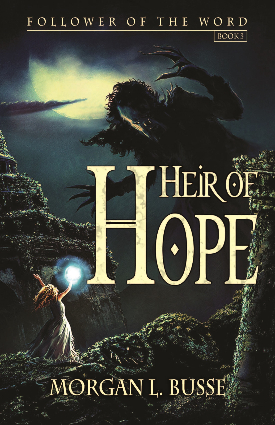
Lovable cardboard people just need Jesus? If only it were so simple.
Christians, we need to repent of a sneaky little sin. Itâs this: We like to justify pretty much any wrongâfrom lame movies and shoddy storytelling, to bad nonfiction books and false teachingâby saying, âOh, but itâs for evangelism. We just want more people to know Jesus.â
In many of our movies and novels, weâre making up shallow and sentimental âpeopleâ so we can more easily âget them to know Jesus.â And in real life, the habit gets even worse.
But until the last few weeks (you can just imagine what national-level thing helped bring this about) I had not often considered the connection between sentimental and unrealistic characters in Christian fiction, and what happens when we treat the fiction as if itâs real.
Perhaps in fiction this is easier to spot. No matter the genre, no matter the publisher, Iâve spotted examples of flagrantly shallow non-Christian characters who simply donât act like real people I have met. In real life, non-Christians are ordinary people who think they are just fine, donât care for biblical faith (or think they have it already), and would just as soon dodge any Christianâs attempt to have a heart-to-heart, actual come-to-Jesus moment.

Sometimes suffering people already know they need Jesus …
But some evangelical fiction shows another picture. You would think that either all non-Christians are nasty villains, or else poor troubled people who canât accept the concept of a loving God because they somehow already know how bad theyâve been. For example:
Charis wanted to cry. Did Michael really mean it? Was he really saying there was a good God who loved everyone in the world â everyone, including her? But he could not mean that, she thought. After all, she was not important, beautiful, wealthy, or special. No one could love her after all the bad things she had done. Not even God.
â Original dialogue, based on that of a Christian contemporary/speculative novel [edit: which at the time Iâd recently read]
Make no mistake. Many non-Christians are clearly suffering and troubled and open about it. They surely would respond to Christians who show them a helping hand. They might want to inquire more about faith. God does love them and wants us to be sensitive to their needs.
But itâs absurd for our fiction to suggest that these are the only kinds of non-Christians weâll ever meet. Itâs the Christian-fiction equivalent of a reversed redshirt: instead of dying early just to show how drastic the danger is, the made-up non-Christian exists just to show how wonderful Jesus is. But what if we only see Jesus helping or saving characters who already know theyâre a mess and are already open to Him, for His convenience and the plotâs? That makes the story boring and redundant and ridiculous. That also shows that Jesus and the gospel will work exclusively in a G-rated, cleaned-up, pre-treated made-up world.
That, of course, is not the world we live in. Nor is it the nature of every real non-Christian.
Sure, some of our non-Christian neighbors may already know theyâre a mess and they need Jesus. Some of them would open right up if we showed them love. And even the ones who outwardly embrace sin might give Christianity a second thought if Christians stopped acting all separatistânot only from the sin but the personâand showing them rejection.
But if we decide that these are the only types of real non-Christians we encounter, and that the only thing we need to do is act more loving, we are living inside a bubble. Weâre making up a non-Christian character whoâs as fake as any figure in a shallow Christian novel. Weâre wishing that all the non-Christians we meet would conform to this caricature. And we wish just as hard that now we only need to show them more love than those bad Christians have.
This is the soft bigotry of low expectations. Hey, if all we need to do is out-holy the bad Christians, what happens to the standard of holiness from the Spirit in us?
This is sentimentalism. Yes, all non-Christians are broken and suffering under the weight of sin. But few already recognize this truth. Many of them love their sin and cannot get enough of it. You know your own temptations to sin (oh, glorious, amazing sin!) that make you feel bad after youâve done it? Imagine that, only with little to none of that bad feeling.
This is self-deception. Jesus constantly warned that people would hate Christians. He did not give disclaimers like, âAnd when they do, know that itâs your own fault.â Sometimes we do bring persecution âon ourselves.â And sometimes we view as persecution things that are not persecution (cf., angry social-network comments). But Jesus did not tell His people only to look constantly to ourselves and determine what weâve done to have it coming. Thatâs legalism talking. Or, if we instead blame Those Other Bad Christians, itâs self-righteousness.
This does not help us love like Jesus. If you spend your whole life expecting and training and encouraging others to show love to someone who is already lovableâbecause they just need to see a more-loving Christian and then theyâll respond warmly?âyouâre doomed to be disillusioned. The real challenge is far worse: You as a Christian are supposed to go up against people who hate you no matter what, and want to control you or even kill you, and still love them.
And ultimately, this can become a false gospel. I canât tell you the number of times Iâve heard this clichĂ©: Jesus ate with tax collectors and sinners, so itâs okay to participate in a questionable activity.
Except the relevant texts specify that Jesus had ordinary dinners with folks. He was not participating in the tax collectors’ Banquet to Commemorate Extortion or the prostitutes’ Festival for Financially Lucrative Fornication.
Except Jesusâs point in visiting with them was not to subvert Godâs law, but made-up laws.
Except Jesusâs point was to show that the people need a great Physician, and that they must repent and believe the gospel and be part of the Kingdom.
In Christian fiction as in real life, what if our gospel does not include repentance and faith? What if we kinda assume someone else will be âbad cop,â who takes care of the hellfire and repentance parts, so that we can be the âgood copâ and only talk about the mercy and love parts? What if we skip over the dark and gritty bits in the name of âevangelismâ? Then we are indeed âevangelizing.â But what weâre sharing is a made-up gospel, to made-up non-Christian characters, ultimately about a made-up Jesus who never did and does not exist.
This chance should make us reboot our reality. It should also reboot our favorite fiction. For what happens when our fiction characters behave more like real people instead of like sentimental pictures copied from shallow megachurch sermon anecdotes? The story gets better. The plot gets thicker. The themes get meatier. The pace quickens. And best of all, the Hero who beats the enemyâor better, befriends the enemy!âbecomes far more awesome.
 Some discussion has swirled around recent speculative series such as The Hunger Games and Divergent as well as Christian speculative books such as Storm Siren by Mary Weber, concerning world-building. Some readers think the fantasy world is well defined and detailed. Others think the world-building is sketchy at best. So which is it?
Some discussion has swirled around recent speculative series such as The Hunger Games and Divergent as well as Christian speculative books such as Storm Siren by Mary Weber, concerning world-building. Some readers think the fantasy world is well defined and detailed. Others think the world-building is sketchy at best. So which is it? In short, I wrote what I knew, and she, as the reader, imagined what she knew. As a result, she felt the world was detailed and well-constructed.
In short, I wrote what I knew, and she, as the reader, imagined what she knew. As a result, she felt the world was detailed and well-constructed.




































 The Ugly
The Ugly





 distinguish between honest judgment and our personal predilections. We all have our natural tastes, and it’s human to mistake our innate liking for an inherent superiority. But in fiction, as in everything, there are higher standards than our own tastes.
distinguish between honest judgment and our personal predilections. We all have our natural tastes, and it’s human to mistake our innate liking for an inherent superiority. But in fiction, as in everything, there are higher standards than our own tastes.




 There are a lot of hungry readers out there. Readers who crave stories that sock ’em in the gut, blow their minds, and leave them gasping for breath, but also stand on Biblical truths and point towards redemption. They want books that are hardcore with a message that is hardcore. Books that challenge them to the point of being uncomfortable, books that shine a light into the dark corners of this sinful world and man’s sinful soul.
There are a lot of hungry readers out there. Readers who crave stories that sock ’em in the gut, blow their minds, and leave them gasping for breath, but also stand on Biblical truths and point towards redemption. They want books that are hardcore with a message that is hardcore. Books that challenge them to the point of being uncomfortable, books that shine a light into the dark corners of this sinful world and man’s sinful soul.









![ms photo 2[1]](http://www.speculativefaith.lorehaven.com/wp-content/uploads/2015/04/ms-photo-21-300x300.jpg)










